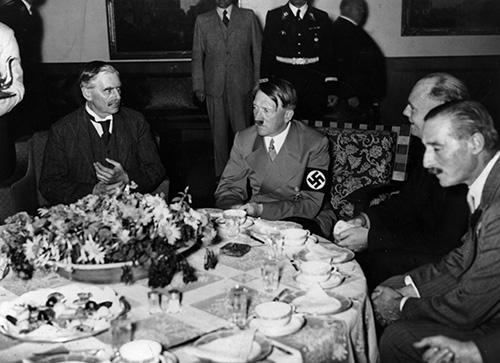Did people agree with Churchill's stand on appeasement?
The 1930s were a dark time in the world’s history. The worldwide economic depression caused widespread hardship and misery around the world. It also led to the rise of aggressive regimes in Japan, Italy and Germany.
By the mid 1930s most of the world’s attention was on Germany. The Nazi leader Adolf Hitler was making demands for territory and other concessions. The international community was divided. The US had withdrawn from world affairs. The leaders of most states in Eastern Europe and the Soviet leader Josef Stalin wanted Hitler stopped. They looked to Britain and France to stop Hitler, but in France and Britain leaders were less certain. British Prime Minister Neville Chamberlain favoured a policy of appeasement – making concessions to Hitler. The French supported the British policy.
Appeasement had a lot of support from many of the most important British and French politicians. Much of the British press and many British people also supported Chamberlain’s approach of appeasement.

Neville Chamberlain (left) and Adolf Hitler at dinner during Chamberlain's 1938 appeasement visit to Munich. (Photo by Heinrich Hoffmann/Getty Images)
In contrast, Winston Churchill was a prominent critic of appeasement. With hindsight it seems puzzling or even outrageous that he wasn’t listened to but is that fair on the politicians of the time? Was Churchill simply a maverick lone voice or did he reflect the views of many ordinary people about appeasement? Using letters from the Churchill Archive you’re going to look at the debate about appeasement as it was happening in 1938 and 1939 and how that debate has been remembered.
Your challenge
We have a box of sources from the Churchill Archive for you to investigate.
• Your challenge is to study the sources in the Source Box and use them to explain whether people agreed with Churchill's stand on appeasement.
• Your teacher will be able to help you with a recording framework and suggestions on how to present your work.
➜ Background information
➜ The sources
➜ Notes for teachers
